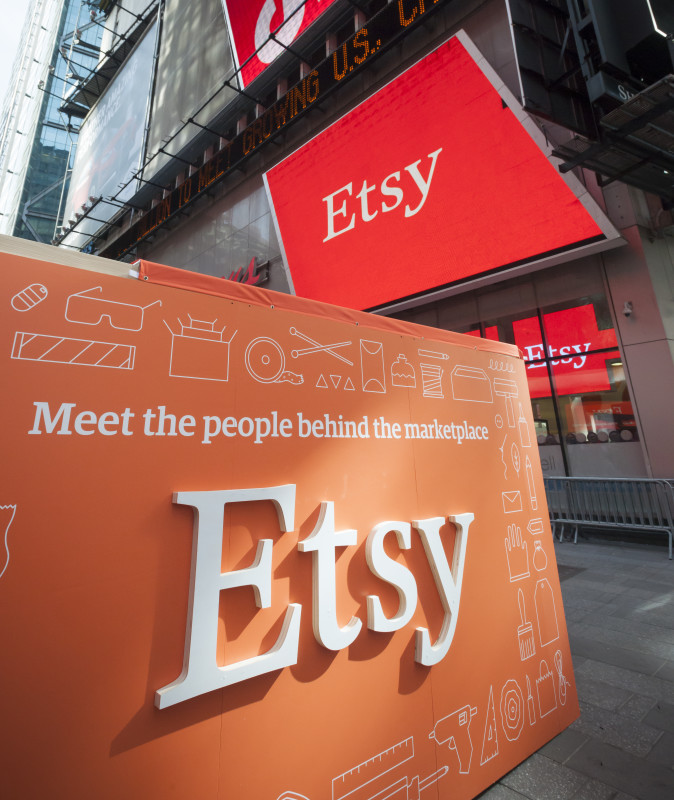
Fast Facts
- Explicit, AI-generated images are readily available for sale on Etsy, the online marketplace.
- The images appear to be in violation of Etsy's terms of use, which prohibit pornography.
- Following TheStreet's report, Etsy took several instances of such images, and at least one shop, off its site entirely.
Etsy, the online marketplace where you can buy everything from hand-embroidered aprons to hand-made furniture, now appears to be home to dozens of shops selling AI-generated pornographic images.
This was pointed out earlier in March by X user Brunna Tom, who tagged Etsy (ETSY) multiple times but received no response.
Without needing to log into the website — meaning there is no way for Etsy to verify whether someone searching is a minor or not — the term "AI Girl," beyond delivering several explicit search suggestions including "AI Girl Squirting," returns several pages worth of results bogged down with explicit or suggestive images of women generated by artificial intelligence.
TheStreet found no such images of men.
Several of the available listings also appear to violate existing trademarks — TheStreet identified listings that sell NSFW (not safe for work) AI-generated, suggestive images that appear to mimic Rapunzel from Disney's "Tangled," Princess Jasmine from Disney's "Aladdin" and She-Hulk from Marvel's "She-Hulk."
Other stores sell a range of explicit AI-generated images of women and girls for anywhere between $1 and $10 per download.
The images, according to information included on some listings, have been viewed dozens of times in the past 24 hours.
Me, trying to sell original material on Etsy and even after 1 year on that not have rights for free listing
— Brunna Tom (@bruna_tom) March 14, 2024
Meanwhile @Etsy allow p0rn p3do AI freely on their website#aigirls @etsystatus @etsy_shops_ #midjourneyArt pic.twitter.com/w9y9fmDOK7
One shop sells an e-book guide whose intention is to instruct people in the creation of AI-generated "adult X-rated content."
The seller says that users who purchase the book (for $18) will get access to AI image-generation sites without filters. The seller says that the guide includes "step-by-step face-swapping instructions and video creation tips."
Etsy's terms of use explicitly "prohibit pornography," though the shop does allow the restricted sale of "mature content." Though Etsy's policies don't clearly define the difference between pornographic and mature content, it does say that mature content must comply with a set of policies, including a "mature" tag on each listing.
None of the listings TheStreet reviewed included the "mature" tag.
The policy also requires that the thumbnails of mature content be "kept appropriate for general audiences."
While some of the thumbnails in question are blurred or merely suggestive, many are openly explicit.
"We are deeply committed to the safety of our marketplace and community. While some mature content is allowed on Etsy, we have long prohibited pornography and we closely monitor our marketplace to identify and remove content that violates our policies," an Etsy spokesperson told TheStreet. "Evolving our policies and expanding our enforcement efforts related to mature content – including in emerging areas like AI deepfakes – is a key priority for Etsy this year.”
The spokesperson said that the company uses both people and technology to flag and review listings that may violate its terms of use.
In the three hours since TheStreet first requested comment, flagging several specific instances of such content, Etsy has taken down several listings and removed one shop — which was selling what appeared to be a nonconsensual AI-generated explicit deepfake of Swedish activist Greta Thunberg — from the site entirely.
Another shop remains active, though many of its listings have been removed.
The instructional e-book listing remains active.
The search term "AI Girl" now includes far fewer instances of sexually explicit thumbnails — though several explicit, non-censored images remain active in the search page. The images based on Disney and Marvel characters likewise remain active.
It is important to note that AI diffusion models employ a mathematical process designed to create variations of the images in their training sets; they "are explicitly trained to reconstruct the training set," according to research scientist Nicholas Carlini.
Related: Deepfake porn: It's not just about Taylor Swift
AI-generated porn and deepfakes
Though the issue of AI-generated porn gained attention in January when synthetic, explicit deepfakes of Taylor Swift went viral on X, the issue has been worsening for years.
In 2017 when it was first reported by Motherboard, AI-generated deepfake porn took days to create. Today, existing image generators allow users to create such images in seconds.
Recent investigations by 404 Media have highlighted the flood of AI-generated porn that is inundating the internet; the organization found Tuesday that Leonardo AI, an image generator that has raised $31 million in funding from investors including Samsung, is being used to generate nonconsensual sexual images of celebrities.
A Stanford investigation last year found hundreds of examples of child sexual abuse material (CSAM) in an open dataset that was used to train popular AI image generators, including Stability AI.
Tools, meanwhile, have proliferated across the internet that allow users to "nudify" people in uploaded images. Last year, a group of high school girls became the victim of AI-generated deepfake porn.
Cybersecurity experts that TheStreet has spoken with in recent weeks have said that the problem has two prongs: one, the generators that allow the creation of these images, and two, the platforms that allow the images to spread.
Recent polling from the Artificial Intelligence Policy Institute (AIPI) found that 82% of American voters believe AI companies should be liable when their tech is used to create fake pornography of real people; 87% believe the social media platforms that spread such images should likewise be held liable.
Contact Ian with tips and AI stories via email, ian.krietzberg@thearenagroup.net, or Signal 732-804-1223.
Related: Human creativity persists in the era of generative AI







